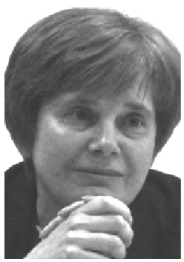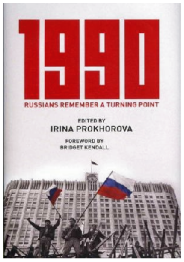IRINA PROKHOROVA |
  | | Irina Prokhorova is the editor-in-chief of the Russian magazine and publishing house New Literary Observer. She came to international prominence in 2012 when, with her brother Michael standing as president, she took part in a live presidential debate with a spokesman for Vladimir Putin. |
| |
|
 
| | Irina Prokhorova
1990: Russians Remember a Turning Point
Foreword by Bridget Kendall
Abridged and translated by Arch Tait
Maclehose Press, Quercus, London, 2013
Hardback, £25.00, ISBN 978-0857052001
E-book, ISBN 978-0857052025
521 pages
Unicorn Press
London, 2013
Order from Book Depository UK or Amazon USA
"Admirably translated." Stephen Lovell, Times Literary Supplement |
| |
|
| | | Although 1989 and 1991 witnessed more spectacular events, 1990 was a year of embryonic change in Russia: Article 6 of the constitution was abolished, and with it the Party's monopoly on political power. This fascinating collection of documentary evidence crystallises the aspirations of the Russian people in the days before Communism finally fell.
It charts - among many other social developments - the appearance of new political parties and independent trade unions, the rapid evolution of mass media, the emergence of a new class of entrepreneurs, a new openness about sex and pornography and a sudden craze for hot-air ballooning, impossible under the Communist regime.
1990 is a reminder of the confusion and aspirations of the year before Communism finally collapsed in Russia, and a tantalising glimpse of the paths that might have been taken if Yeltsin's coup had not forced the issue in 1991. |
| |
|
| | | This enormously absorbing work shows us that the collapse of the Soviet Union, so extensively described by contemporaries and analysed by economists and political scientists, is ripe for appropriation by historians. “1990: Russians remember a turning-point” contains chapters on a fascinating diversity of topics: food, school-teaching, the miners’ movement, ballooning and provincial television, to name but five. Its primary achievement is to plunge readers back into that turbulent moment and to make strange an era that has perhaps come to seem too familiar after all those telescoped accounts of the fall of Communism. Not only does the book range widely in its subject matter, it also offers instructive interplay between retrospective analysis and contemporary perception: among reflections on the long-term consequences of events in 1990, we find diary extracts and month-by-month digests of the contemporary press. The resulting kaleidoscope effect is a notable feature of this abridged and admirably translated English edition.
The relative lack of bloodshed in the early 1990s gives much to be thankful for, but it is telling that in hindsight the best thing about the year 1990 is a negative: what did not happen rather than what did. The sad fact, for Russian liberals in the Putin era looking back on the legacy of that year, is that there is rather little to rejoice at. So many subsequent developments - the capitulation of the most influential mass media to state power, the opinion polls that show large parts of the Russian population favouring authoritarian, xenophobic “stability” - have proved disappointing.
As intellectuals debated in the thick journals how human a face the future market might have, the nomenklatura was busy stuffing its pockets. The language of universalism was belied by the enduring reality of Russian particularism. Even as we reflect on the authoritarian trends in contemporary Russia, it is salutary to be reminded, not least by the very fact of this book’s existence, that not all the strivings for liberation were in vain.
Stephen Lovell, Times Literary Supplement, 27 September 2013 (abridged) |
| |
|
| | From Irina Prokhorova, 1990:
31 December 1989, 23:50 hrs.
Gorbachev begins his New Year address with a grave, almost tragic expression. “No matter how difficult this year has been, we bid it farewell with feelings not only of regret ...” For an instant fear, almost horror, shows in his face. What does he see ahead? What does he sense?
His eyes light up again, the eyes of Gorbachev the optimist, by outlook and heredity. He talks again about the future, with that sense of hope so traditional in our afflicted land. “The post-war division of Europe is a thing of the past … solidarity … harmony.”
The Kremlin chimes ring out. For the first time in many years, a choir actually sings the words of the national anthem! “Glory to thee, our great homeland of freedom …” Good. At last that doesn’t ring false. But then, oh dear: “Bulwark unfailing of peoples united …” That jars! Neither do we need the view of Lenin’s mausoleum, or the words about his Party leading us forward to the triumph of communism.
What will the nineties hold for us?
Diary of Marietta Chudakova |

